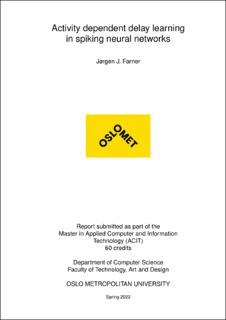| dc.description.abstract | Several observations indicate activity dependent changes in the propagation velocity of action potentials in biological neural networks. These changes are believed to be deliberate mechanisms in the brain used to mediate the delays of the connections between neurons for functional purposes. These observations have created a great interest from the research community in the role of neuronal delays. In order to explore these mechanisms, a novel delay learning mechanism has been developed that adjusts delays based on local activity. The main aspect of the learning method is to align the delays of pre-synaptic spikes that are causally related to a post-synaptic spike. The theory is that this will consolidate activity that is related to similar inputs, consequently allowing the network to separate inputs into classes. To accommodate for this method, a coding framework that allows for local delay learning in spiking neural networks was created. A novel method for detecting polychronous groups for the purpose of performing classification tasks was also developed. The delay learning method was applied to various network topologies, and the learning method showed a significant performance improvement when applied to feed-forward networks over identical static networks. The performance was measured on a classification task involving inputs encoded based on relative spike latencies. It was also shown that using rate-coded inputs leads to diverging and unstable delays, indicating that this might not be an appropriate encoding method for this temporal learning mechanism. Finally, the learning mechanism was applied to feed-forward topologies to perform classification on images from the MNIST dataset. The plastic networks showed a significant performance increase over identical static networks. | en_US |
